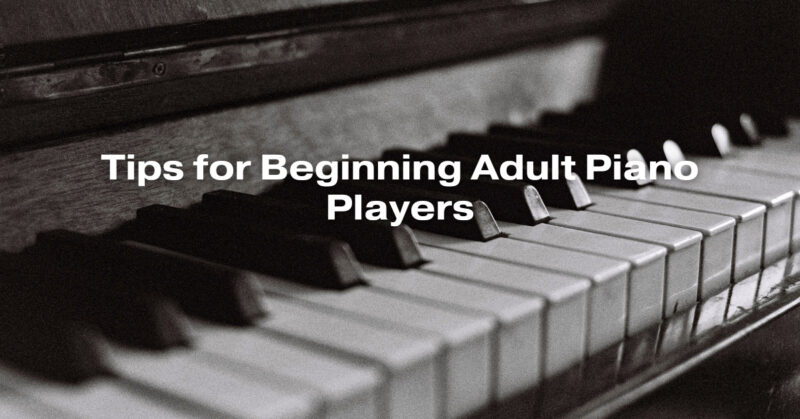Learning to play the piano as an adult is a fulfilling and enriching experience. Whether you’ve always wanted to play or are rediscovering a childhood passion, embarking on this musical journey can be both challenging and rewarding. To help you get started and make the most of your piano learning adventure, here are some valuable tips for beginning adult piano players.
1. Set Realistic Expectations
- Understand that progress may be slower for adult beginners compared to children. Be patient with yourself and avoid unrealistic goals.
- Focus on the joy of learning and making music, rather than solely aiming for technical perfection.
2. Find the Right Instructor
- Consider taking lessons with a qualified piano teacher who specializes in adult learners.
- Discuss your goals and preferences with the instructor to tailor your lessons to your needs.
3. Create a Consistent Practice Routine
- Dedicate regular time slots for practice in your schedule. Consistency is key to building skills.
- Even short daily practice sessions can yield significant improvements over time.
4. Start with the Basics
- Begin with fundamental concepts like hand positioning, finger exercises, and music theory.
- Choose beginner-friendly music pieces to build your confidence.
5. Embrace Technology
- Utilize digital resources, apps, and online tutorials to complement your learning.
- There are many interactive apps and websites designed to help adult beginners learn the piano effectively.
6. Develop Good Technique
- Focus on proper hand positioning and posture to avoid strain or injury.
- Gradually work on finger independence and strength through exercises.
7. Learn to Read Music
- Acquire the skill of reading sheet music, starting with simple pieces and gradually progressing to more complex compositions.
- Regular sight-reading practice will improve your music-reading abilities.
8. Listen Actively
- Listen to recordings of piano music and pay attention to different interpretations.
- Try to replicate the expressiveness and dynamics you hear in your own playing.
9. Set Achievable Goals
- Define clear, attainable goals for your piano playing, such as learning a specific piece or passing a grade examination.
- Celebrate your accomplishments along the way.
10. Stay Inspired
- Surround yourself with music that inspires you. Explore various genres and styles to keep your enthusiasm alive.
- Attend live piano performances or watch videos of accomplished pianists to reignite your passion.
11. Don’t Fear Mistakes
- Mistakes are a natural part of the learning process. Embrace them as opportunities to improve.
- Avoid perfectionism, as it can hinder your progress and enjoyment.
12. Join a Community
- Consider joining a local piano club, online forum, or social media group for adult piano learners.
- Sharing your experiences and learning from others can be motivating and educational.
Conclusion
Learning the piano as an adult is a wonderful endeavor that offers numerous personal and cognitive benefits. These tips for beginning adult piano players are designed to help you navigate the challenges and enjoy the rewards of your musical journey. Embrace your passion for music, stay committed to your practice routine, and savor every moment of progress along the way. With determination and dedication, you can achieve your piano playing goals and experience the joy of making beautiful music.


